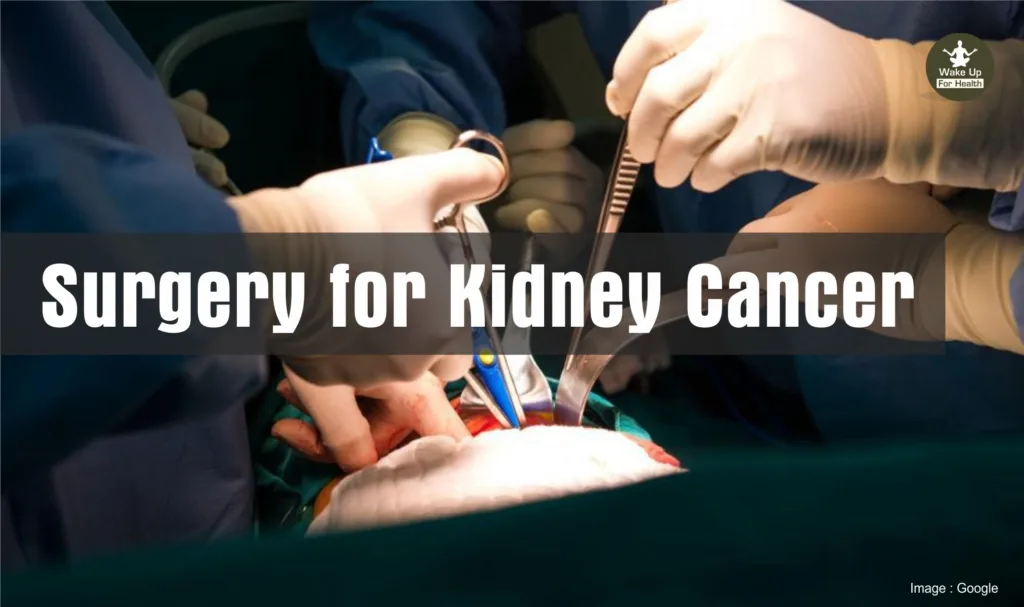Kidney cancer, also known as renal cancer – is a disease in which cells in the kidney i.e our kidneys become malignant (cancerous) and grow out of control, forming a tumour. Almost all kidney cancer first appears in the lining of the small tubes (tubules) in the kidney. This type of kidney cancer is called renal cell carcinoma. But, most kidney cancers are found before they have spread (metastasized) to distant organs. However, it is easy to treat successfully if it is detected in time. However, these tumors can grow quite large before they are detected.

Our kidney is made up of two bean-shaped parts, each about the size of a fist. They are present in the vertebral column in our lower abdomen. The main job of the kidney is to clean the blood from the body, remove waste products, and make urine.
What is Kidney Cancer?, Symptoms, Types, Causes, Treatment Methods
In many cases, the cause of kidney cancer is not known. However, there are some factors which increase the risk of getting kidney cancer. For example, kidney cancer often occurs in people over the age of 40. Additional kidney cancer risk factors are listed below:
- If you smoke, your risk of kidney cancer is twice that of a non-smoker. Cigar smoking may also increase your risk.
- Kidney cancer is about two times as common in men than in women.
- Excess weight can cause changes in hormones that increase your risk. Due to which the risk of this cancer increases.
- Certain genetic conditions, such as von Hippel-Lindau (VHL) disease or inherited papillary renal cell carcinoma, increase the risk.
- Family history of kidney cancer The risk is particularly high in siblings.
- Exposure to certain chemicals, such as asbestos, cadmium, benzene, organic solvents, or certain herbicides increases the risk.
This disease is also being huge problem for human being : H. Pylori Bacterial Infection: Causes, Symptoms and Treatment
How to Diagnose Kidney Cancer?
• Physical Examination:
The doctor will first physically examine the patient, and note down the patient’s symptoms. The doctor will also note down the medical history and family history of the patient.
• Urine Test:
This test is done to check the presence of blood in the urine.
• Blood Test:
This test helps to check the different types of blood cells in the body and the levels of different electrolytes in the body. Blood tests are helpful to diagnose anemia (low number of red blood cells), or if kidney function is impaired (by checking creatinine levels).
• Computed Tomography (CT or CAT) Scan:
This is an imaging test that uses radio waves to obtain cross-sectional images of the body’s internal organs. This procedure can be done using a special dye. Some patients might not be able to receive the dye if they have compromised kidney function.
• Magnetic Resonance Imaging (MRI):
This is an imaging test that uses a strong magnet, radio waves and a computer to create images of the body’s internal organs.
• Ultrasound:
This procedure uses high-frequency sound waves to create images of the internal organs of the body. It is helpful in detecting tumors, as they have a different density than healthy tissue.
• Renal Mass Biopsy:
In this procedure a thin needle is inserted into the tumor and a small portion of tissue is removed. This tissue sample is then sent to a laboratory to check for the presence of cancer cells.
What are the Symptoms of Kidney Cancer?
The biggest strange thing is that there are no symptoms in the beginning of kidney cancer. Most of the patients do not even know about this, and they do not notice these initial symptoms. They go on living considering it to be a minor problem.
Those patients do not even have a clue that they have cancer or tumor in their kidney.
is developing. But as time goes on, when the tumor starts increasing in size, then they get all the other symptoms.
It is becoming apparent that he has kidney cancer. The point to be noted is that in the patients in whom this clarity starts coming, more than one symptom starts getting clear. Those symptoms can be any of the following:
- When urinating, blood comes out with it.
- An aching pain, or a feeling of heaviness, in the back, especially on the sides.
- Fever for no reason.
- Hemoglobin deficiency, which we call anemia.
- Unnecessary loss of body weight.
- Swelling of feet or calves.
- Bleeding while urinating.
- Belly knot or a knot, which is formed in the stomach.
- There is a pain on the same side of the abdomen, which is not correct.
- Weight loss for no apparent reason, as well as cold
- Being very tired.
- Decreased blood circulation.
When there is cancer in the kidney, it spreads to other parts of the body, and then, some of these symptoms are born. Here are those symptoms:
- A problem that is felt in breathing.
- Whenever there is a cough, bleeding with it.
- Joint and bone pain.
What are the Types of Kidney Cancers?

There are different types of kidney cancer.
1. Renal Cell Carcinoma (RCC)
- It is the most common type of kidney cancer in adults. About 85% of all kidney cancers are renal cell carcinoma.
- Although it typically starts out as a single tumour in just one kidney, it can also affect both.
- This type of cancer begins in the cells of the small tubules that are a part of the nephron (the functional unit of the kidney that produces urine) in the kidney.
2. Transitional Cell Carcinoma (TCC)
- This type of cancer accounts for about 6 to 7% of all kidney cancers.
- This cancer usually starts where the ureter (a tube that carries urine from the kidney to the bladder) connects to the kidney. The renal pelvis refers to this region. This type of cancer can also occur in the bladder (the organ that stores urine) or the ureter.
3. Renal Sarcoma
- This type of cancer is very rare and accounts for only 1% of the total kidney cancer cases.
- This type of cancer starts in the connective tissue of the kidney.
- If it is not treated, this cancer can spread to nearby bones and organs.
4. Wilms Tumor
- It is the most common type of kidney cancer seen in children.
- It accounts for about 5% of the total kidney cancer cases.
What are the Prevention For Kidney Cancer?
Although there is no known way to prevent kidney cancer, some precautions may help reduce the risk of developing kidney cancer, including:
- Eat a healthy and balanced diet.
- Keep blood pressure under control.
- Exercise daily to stay healthy.
- Abstain from smoking and alcohol.
- Save yourself from stress or tension.
Kidney Cancer Treatment?
Surgery for Kidney Cancer (How to Operate Cancer?)

These are the main surgical procedures used to treat kidney cancer. The type depends on how advanced your cancer is. The kidney, adrenal gland, and surrounding tissue are removed during a radical nephrectomy. It often also removes nearby lymph nodes. The most frequent operation for kidney cancer can now be performed with a laparoscope through a small incision.
Simple nephrectomy only removes the kidney. Partial nephrectomy removes the cancer in the kidney along with some of the surrounding tissue. This procedure is used for patients with small tumors (less than 4 cm).
You can live with only part of one kidney as long as it is working. You’ll require dialysis equipment or a new kidney if both of your kidneys cease functioning (kidney transplant).
Your doctor can advise an alternative strategy to help remove the tumour if surgery is unable to eradicate the kidney cancer. Cryotherapy uses extreme cold to kill tumors. Radio frequency ablation uses high-energy radio waves to destroy the tumor.
What is Biological Therapy for Kidney Cancer?
This treatment strengthens, directs, or restores your body’s natural defences in order to fight cancer using your immune system. For biological therapy, substances are made by your body or in a laboratory. Interferon-alpha and interleukin-2 are a couple of examples of biologic treatments for metastatic kidney cancer.
Know About Prostate Cancer: Symptoms, Causes, Surgery & Home Remedies
What is Targeted Therapy for Kidney Cancer?
With reduced damage to healthy cells, this therapy locates and destroys cancer cells using medicines or other chemicals. Anti-angiogenic drugs are one sort of targeted therapy. These block the blood vessels that feed the tumor, causing it to shrink or stop growing.
Another type of targeted agent is known as a multikinase inhibitor or tyrosine kinase inhibitor. These are oral medications that block an enzyme pathway that allows cancer cells to grow. m-TOR inhibitors are a third class of targeted therapy. There are two of these drugs available, one given orally and one given by IV. They block a pathway that allows blood vessels to help tumor cells grow. Each drug has an important role to play in the management of kidney cancer.
What is Immunotherapy for Kidney Cancer?
Immunotherapy has greatly improved the outcome of advanced kidney cancer over the past decade. It is given either as a single agent or in combination with oral target therapy. With this procedure, the duration of disease control has increased from an average of 8–9 months to 16–20 months and greater shrinkage of tumors can be expected, ultimately prolonging the lifespan of patients.
What is Chemotherapy for Kidney Cancer?
Drugs are used in this therapy to either kill or inhibit the growth of cancer cells. Chemotherapy is mostly utilised for a specific type of kidney cancer that involves spindle cells since it is less successful than other types of cancer (the sarcomatoid type).
(Disclaimer : The purpose of this health-related article is to wake you up and aware of your health and to provide health-related information. Your doctor has a better understanding of your health and there is no substitute for their advice.)
2 thoughts on “Kidney Cancer: Understanding Symptoms and Treatment”